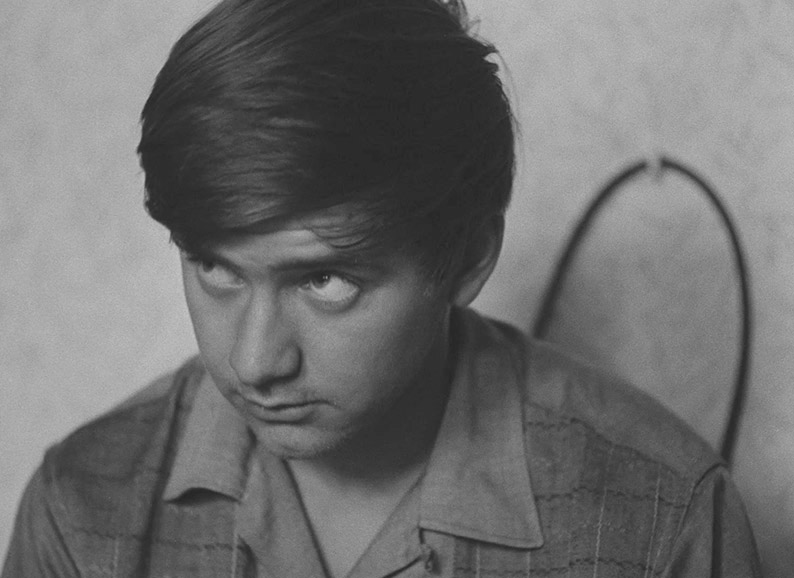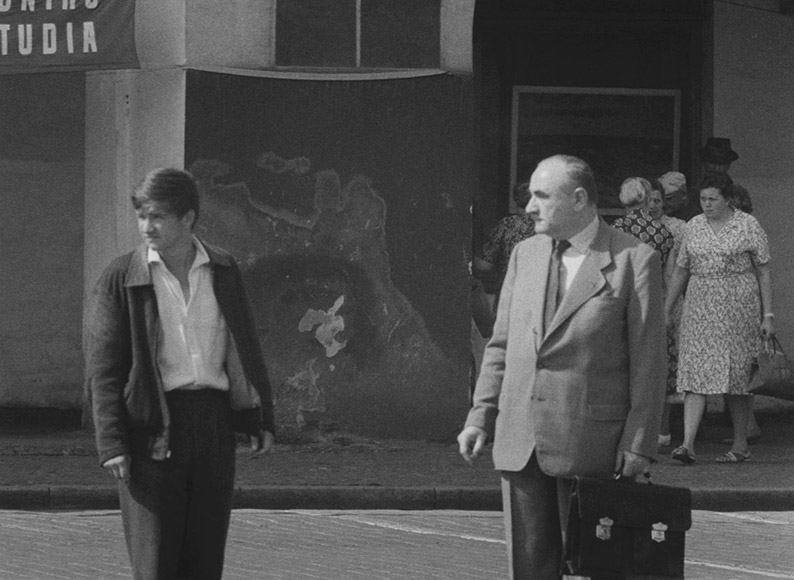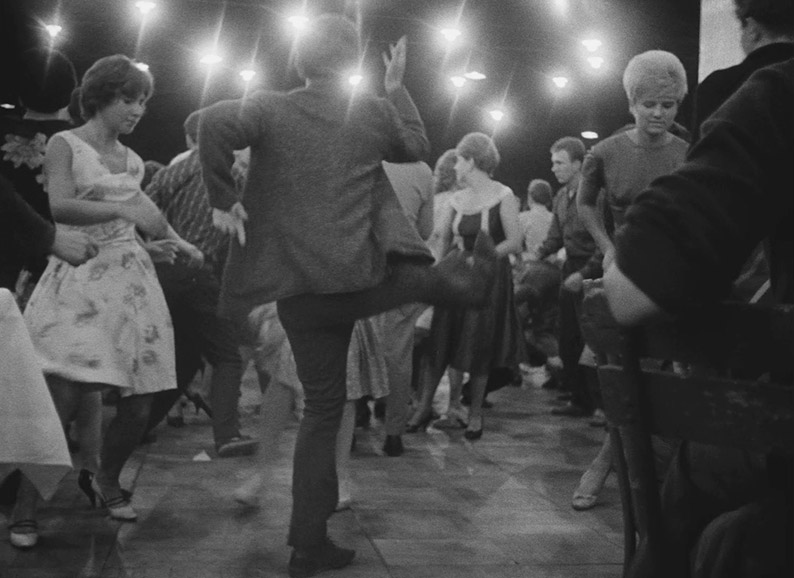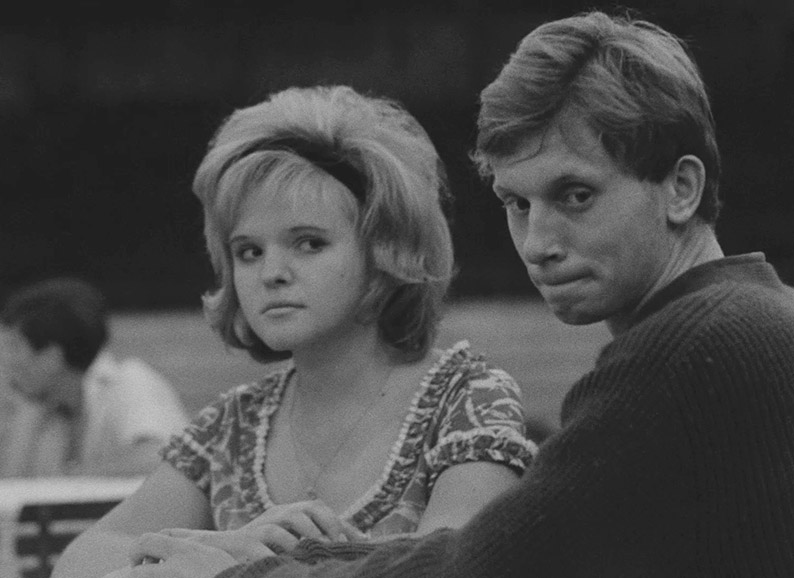|
Let's talk film theory. In an effort of simplify the structure of the typical story narrative, Bulgarian-French historian, philosopher, critic and essayist Tzvetan Todorov proposed that most tales are constructed around the following five steps:
- Equilibrium
- Disruption
- Recognition of the disruption
- Attempts to repair the disruption
- Return to Equilibrium
Thus, the theory goes, most narratives begin by portraying a state of equilibrium specific to the story's characters and the world in which they live. We're introduced to them and get to know them a little, and the story proper only really gets going with the arrival of a disruption of some kind and the attempts of the lead character(s) to put things right. I could quote endless examples, but here are a few from some titles just about everyone will have heard of or seen: when young farm boy Luke Skywalker discovers a holographic message in an old droid and his parents are murdered; when Amity Island's busy summer tourist trade is threatened by the death of a girl in what looks like a shark attack; when the crew of the commercial space tug Nostromo on its way back to Earth respond to what it initially believes is a call for help and inadvertently let a lethal alien on board; when the young daughter of a successful actress begins behaving in a manner that medical science can find no explanation for and begins showing signs of demonic possession; when a New York detective is invited by his ex-wife to her company's Christmas party and the building is invaded by German terrorists. And while this (together with Joseph Campbell's now famous The Hero with a Thousand Faces) has become the template for the vast majority of Hollywood movies, as a structural theory it can be applied to a disarmingly wide range films from all genres and corners of the globe.

One of the notable achievements of the French nouvelle vague and indeed the new wave cinema of a number of European and Eastern European countries is that it produced stories that did not conform to this tradition and even actively kicked against it. Seemingly (though probably not) for the first time, narratives did not need a manufactured disruption or equilibrium-resetting resolution to be interesting, and it became clear that if portrayed with honesty and realism, then life itself could be interesting enough to become the basis of an arresting film. If you're looking for an example of that theory being put into practice, then Second Run have you covered with their new Blu-ray release of Black Peter [Černý Petr], the first dramatic feature by One Flew Over the Cuckoo's Nest and Amadeus director Miloš Forman.
To put it bluntly, there simply is no traditional disruption in the narrative of Black Peter, which remains in a state of equilibrium from start to finish and leaves us with the feeling that it is set to continue long after the film itself abruptly concludes. The focus of its attention is the eponymous Peter (or Petr, if we're being accurate to the original Czech spelling), a glumly unenthused teenager whom we first meet when he arrives at a small supermarket to start work as an apprentice store detective. In other films this new job would have triggered the expected disruption, but here it appears to be just one more thing that the downcast Petr is set to be unsuccessful at. His attempts to woo local girl Pavla are similarly half-hearted, nobbled at every stage by his lack of self-confidence and a seeming uncertainty about what he really wants from life. None of this is helped by an over-protective mother who probes for details about everything he does and a father who dishes out daily lectures on how he should behave if he wants to get anywhere. Sound familiar? Maybe not. Perhaps everyone reading this knew exactly what they wanted to do with their life from an early age and were wowing the opposite sex from the moment their hormones started to explode. But I'm guessing that's not the case, and that Petr's awkwardness in his new job, with the opposite sex and even his own parents will bring back a few memories for the average viewer. And herein lies the gentle hook of the film, one of recognition and empathy with the lead character as he bumbles his way into a job for which he has received only a scant introduction and no useful guidance, or as he tries to find the right words to ask the distracted Pavla for a date and gets cautiously protective of his claim to her when approached by pushy yob Čenda, who is quickly revealed to be every bit as insecure as Petr, just louder in his attempts to conceal it from others.

This may make the film sound like a downbeat experience, especially given the almost documentary realism of Foreman's approach, one enhanced by a cast made up primarily of non-professionals and a camera style that often observes from a distance as if recording moments and exchanges from a narrative that is unfolding without the aid of directorial guidance. But like the Ken Loach films that Foreman's early work inspired, the drama of Black Peter is buoyed by its sly sense of humour. This approach is signalled from the opening frames, as the supermarket manager arrives at work to the comically blaring pomp of what we know now as the Big Top circus theme (which I learned from the commentary is actually a Czech military march titled Entry of the Gladiators by Julius Fučik), which then drops in volume as he turns down the radio from which we can presume the music is emanating, and there's a teasing air of amusement to the act of just observing the hands of customers as they fiddle with goods that we somehow expect them to steal but are almost always either returned to the shelf or placed in their shopping basket. But it's when Petr becomes convinced that a respectable-looking middle-aged gent has been pocketing goods – an opinion based on little more than the man's facial expression – that the observational humour moves into the realms of Buster Keaton-esque absurdity. On the advice of a busy co-worker, Petr chases after the man and pursues him across town, sometimes at such a comically close distance that he makes his presence obvious to the person he is supposed to be secretly shadowing. It becomes increasingly clear that has no idea how to confront the man, and we're eventually left to speculate on just how long he stayed on his tail before heading home to be admonished by his father for skipping work. The pursuit is all the funnier for being allowed to play out in verbal silence, with the man's awareness that Petr is following him conveyed by the enquiring stares that he calmly tosses in Petr's direction, which Petr responds to by looking hurriedly around him at nothing in particular, an action that will be familiar to anyone who has been caught staring at someone and has then unsuccessfully tried to hide it.
The film's large-scale centrepiece (which has a terrific opening wide shot) comes when Petr takes Pavla to a local dance, where he is verbally confronted by Čenda for not saying "hello" (which in Czech is "Ahoj" and pronounced "Ahoy!") with enough enthusiasm, while Čenda's scrawny sidekick Zdenek looks on as his friend gets slowly drunk and makes a fool of himself. It's here that Čenda's own insecurities are laid bare, as he demands that Zdenek watch him as he approaches a girl who clearly likes him but to whom he is unable to communicate, instead briefly sitting beside her before returning to see if his concept of a bold move was observed by distracted friend. Despite having arrived with a girl in tow, Petr is similarly apprehensive about the whole thing, watching others dance from the sidelines and quietly mimicking their moves in the hope of not making a complete tit of himself when he gets on the dance floor, which is delayed by his own need for a few glasses of Dutch courage. And while seemingly stuck in Čenda's shadow for reasons only long-term friendship can make sense of, Zdenek shares neither Petr nor Čenda's hesitance over women, and in a particularly revealing sequence asks a girl onto the dancefloor without a whisper of apprehension and then proceeds to delight her with his exuberant dance moves. I was left thinking that Zdenek could quickly and decisively make something of his life if he could just ditch his friend and go his own way instead – take it from someone who spent a few years in his youth playing Zdenek to a Čenda of his very own.

Thoroughly engaging through it is as social drama, to really get a feel for the film's importance you need to contextualise it to the time and place of its birth and imagine what it must have been like, after years of formally structured and propagandist Czech cinema, to encounter something as refreshingly free-wheeling and grounded in reality as Black Peter. Like the Italian neo-realist and French nouvelle vague films that preceded and inspired it, this film held up a mirror to life as it was instead of painting an idealised and artificial picture of how the ruling authority deemed it should be portrayed, one that its audience would have instantly recognised and responded to. And it did so with a sense of humour that grows not from a calculated attempt to stage a gag, but the awkwardness, uncertainties and generation gap frustrations faced by teenagers the world over. It's this freshness, perceptiveness, humour and universality that saw the film find an audience beyond home territory back in 1964 (it won the top prize at the Locarno International Film Festival in Switzerland), and makes it even after all these years later such enthralling and rewarding viewing.
The Blu-ray features an HD restoration of the film carried out in 2017 by Cinepost Barrandov studio in Prague under the supervision of the National Film Archive from the original negative, with missing parts taken from a duplicate positive. The results are very impressive, with generally crisp image and an attractively rendered tonal range. There is some variance in the contrast and the black levels are rarely solid, but this does preserve shadow detail and is likely intended – an opening caption states that the aim of the restoration was to present the film how it would originally have been seen and that "various features that originate from the shooting of the film or its laboratory processing have been preserved and are evidence of the technologies and creative approaches of the time." Almost all trace of damage and dust has been removed and there's not a hint of picture jitter anywhere. Very nice.

The Linear PCM 2.0 mono soundtrack has been sourced from a duplicate positive and is in fine shape, being clear and clean of damage or background hiss. The dialogue has a treble bias and lack of fullness typical of films of this vintage, but the music is very nicely rendered throughout.
Optional English subtitles kick on by default but can be switched off.
Life as It Is: Miloš Forman on his early Czech Films (31:22)
A new production from Robert Fischer's Fiction Factory, based around an older, standard definition video interview with Forman, which pleasingly has been presented in its original 4:3 aspect ratio rather than enlarged to fill a 16:9 frame, as some cine-miscreants are a little too fond of doing. A typically entertaining Forman recalls wanting to go into show business from an early age, getting into film school and responding to the inspirational talents of its teachers, the influence of Alfréd Radock on his development as a filmmaker, his first documentary feature and its accompanying short film, the influence of Italian neorealism and French cinema vérité, and the unified vision that bonded him with other pioneering young Czech filmmakers of the time. A good part of the running time is devoted to Black Peter, particularly the use of non-professional actors, which Forman talks about in enthralling detail. Intriguingly, an opening caption identifies this as "Part 1", but there's no Part 2 and the final credits are preceded by the words, "To be continued…", which suggests that another early Forman film is heading to UK Blu-ray in the not too distant future. A Blonde in Love, perhaps?
Audio Commentary with Michael Brooke
When it comes to Eastern European cinema, freelance writer Michael Brooke could talk for England and probably still have material waiting in the wings for a second go. This excellent commentary is filled to the brim with fascinating and revealing information on the film and its making and perceptive observations about individual scenes, Forman's filmmaking technique, and subtextual elements that I barely picked up on in a single viewing. It's also one of those commentaries that is so detailed and comprehensive that I found myself both enthralled and increasingly downcast as I heard just about every observation I had made and noted down to include in my review covered with more authority, something I've long ago just had to learn to live with. I learned so much here, and Brooke absolutely nails what makes the film so special, despite its lack of formal plot or resolution. Terrific.

Interview with actress Pavla Martínková (15:58)
An interview with Pavla Martínková (who plays Pavla in Black Peter) recorded in the middle of a hockey rink in the Winter Stadium at Kolin, which is where the film's dance hall centrepiece was filmed. There's interesting stuff in here (including an observation about the role of theft in Forman's early films), but for a non-Czech speaking viewer it proves harder work than it need be. The interview itself is intermittently disrupted by an unproductive use of split-screen and some drifting cover-shots that pull back to reveal the crew, and it's repeatedly put on pause for clips from the film, which must constitute half the running time but which, a tad frustratingly, are not subtitled in English.
Trailer (1:39)
A staccato trailer for a film that doesn't really lend itself to the traditional trailer structure, but I still couldn't help thinking the right editor could put together a more seductive sell.
Booklet
As if the commentary hadn't made my own scribblings above feel inadequate enough, the disc also includes a booklet with an authoritative essay by Jonathan Owen on the cinema of Miloš Forman and Black Peter in particular, which he analyses in the sort of thoughtful detail that makes me want to immediately re-watch the film and rewrite my review. Also included are credits for the film and some production stills.
For his first dramatic feature, Miloš Forman drew on the observational style of his previous documentary work and took inspiration from the naturalism and structural rule-breaking of the nouvelle vague, and created a work that is recognised as one of the films that kick-started the Czech New Wave. Its canny blend of realism and character comedy still delight today, while its observations on what felt at the time like the uphill struggles of youth should ring a few bells with all but the most self-confident of (former) teenagers. Second Run have done a great service in making the film available on Blu-ray with such a fine transfer and such generally excellent special features (I'll give the Pavla Martínková interview a pass for the content that is worthwhile), and the disc thus comes enthusiastically recommended.
|